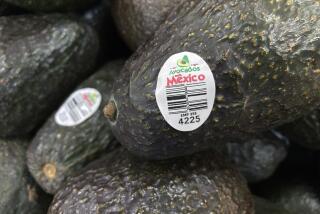Irvine Co. Sees Bugs in USDA Avocado Data
The Irvine Co., which owns and operates the nation’s largest avocado farm, is anxiously awaiting a U.S. Department of Agriculture decision on whether to remove an 82-year-old ban on Mexican avocado imports.
The USDA rule change was proposed in July 1995, and the industry expects a decision to be issued soon. The move could benefit such U.S. farm products as peaches, nectarines and cherries that have been held up while Mexico has argued for its avocados to be allowed across the border.
California growers, who supply more than 90% of the nation’s avocados, are strongly opposed to allowing Mexican imports. They say they don’t object to new competition from low-priced imports--Mexican avocados sell for about half the price of the U.S.-grown fruit on the world market--but to the threat of pest infestation. They have accused the USDA of relying on faulty data that underestimate the risk from fruit flies and other pests.
“It is one of the key issues facing the industry,” said Peter Changala, director of Irvine Co.’s agricultural operations. The company just began planting 500 new acres, bringing its total avocado production to 1,700 acres.
After making it through the drought that plagued California earlier in the decade, “we’d hate like heck to have our trees tampered with or infested,” Changala said.
Patrice Apodaca covers economic issues for The Times. She can be reached at (714) 966-5979 and at patrice.apodaca@latimes.com.
More to Read
Inside the business of entertainment
The Wide Shot brings you news, analysis and insights on everything from streaming wars to production — and what it all means for the future.
You may occasionally receive promotional content from the Los Angeles Times.











